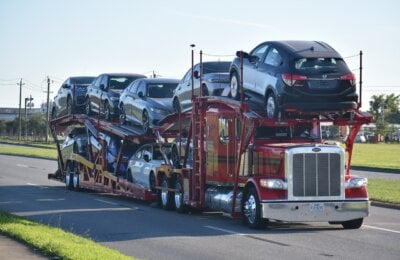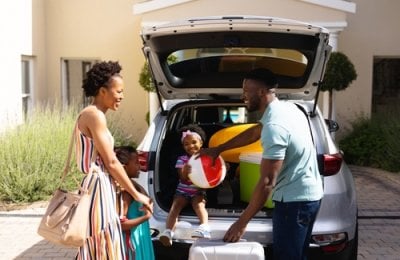
Reading Time: 7 minutes
Are you ready for a camping adventure? Whether you’re a seasoned camper or just starting out, towing a camper can be a daunting task. But don’t worry! With a little bit of preparation, you can safely and confidently tow your camper to your destination. In this article, we’ll explore everything you need to know about how to tow a camper. This includes safety tips, the right equipment to use, and what kind of vehicles are best for towing.
Looking for reliable insights on vehicle transportation? Click to read our comprehensive guide on the Nationwide Auto Transportation blog, where we break down the essentials of car shipping, offer expert tips, and answer your most pressing questions. Whether you’re a first-timer or a seasoned pro in auto transport, our latest post is your one-stop resource for all things car shipping.
How to Tow a Camper: The Basics
Before you hitch up your camper and hit the road, it’s important to understand the basics of towing. Towing a camper can be challenging, especially for beginners. But with the right information and preparation, you can avoid accidents and make your trip an enjoyable experience.
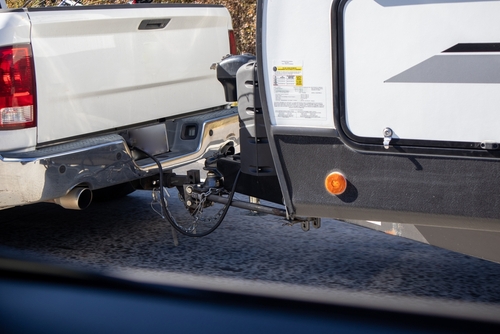
What Do You Need to Tow a Camper?
First things first, let’s go over the equipment you’ll need to tow a camper. You’ll need a tow vehicle with a hitch that can handle the weight of your camper. Additionally, you’ll need a weight distribution system to ensure that your camper’s weight is evenly distributed. A reliable braking system is another. Finally, invest in high-quality towing mirrors to improve your visibility while on the road.
What SUVs and Cars Can Tow a Camper?
One of the most common questions we get is what kind of vehicle is best for towing a camper? Generally, SUVs and trucks are the most suitable for towing, but not all models are created equal. Before purchasing a tow vehicle, check the towing capacity. If you intend to tow, you must ensure that it can handle the weight of your camper.
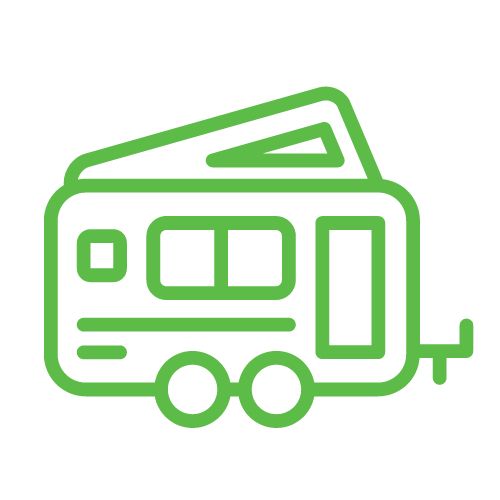
How to Tow a Pop-Up Camper
Pop-up campers are a popular option for camping enthusiasts. They are compact and affordable. You need a vehicle with a hitch that can handle the weight of the camper and a weight distribution system to tow a pop-up camper. Additionally, make sure that the camper is properly secured to the hitch and that the trailer lights are working correctly.
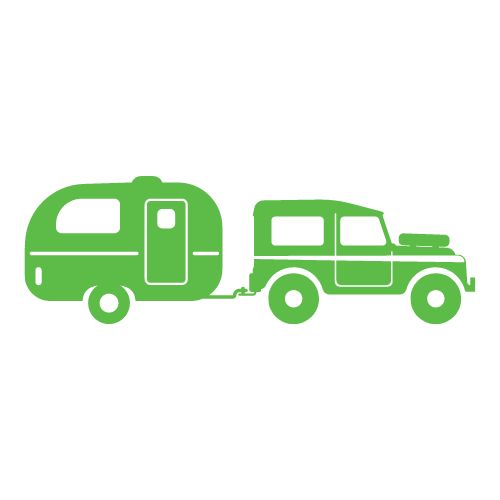
How to Tow a Fifth-Wheel Camper
powerful tow vehicle to handle the weight. A pickup truck is typically the best option for towing a fifth-wheel camper. You’ll need a special hitch that attaches to the bed of the truck. Before hitting the road, make sure that the hitch is securely attached and that the camper is level and stable..
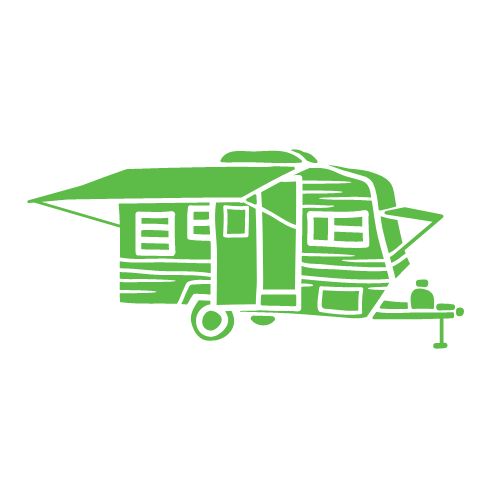
How to Tow a Camper Trailer
The freedom to detach the trailer from the tow vehicle gives you more mobility once you arrive at your destination. To tow a camper trailer, you’ll need a tow vehicle with a hitch that can handle your trailer’s weight. Additionally, make sure that the trailer lights are working correctly and that the trailer is properly secured to the hitch.
How Much Does It Cost to Tow a Camper?
The cost of towing a camper can vary depending on a variety of factors:
- weight of the camper,
- distance traveled,
- price of gas.
Additionally, there may be additional costs associated with maintenance and repairs for both the tow vehicle and the camper. Factor in all these expenses to get an accurate estimate of the cost of towing a camper.
How to Tow a Camper Safely
Towing a camper can be a safe and enjoyable experience if you take the necessary precautions. Here are some safety tips to keep in mind while towing:
- Be aware of the weight and size of your camper. Make sure your vehicle can safely tow the weight of your camper. Ensure that the hitch and tow vehicle are compatible. Additionally, it’s crucial to know the height and width of your camper to ensure safe clearance on the road.
- Use the right equipment: Using the right equipment is crucial for safe and successful towing. Make sure you have a reliable hitch and weight distribution system that’s appropriate for your camper’s weight and size. Additionally, invest in high-quality towing mirrors to improve your visibility on the road.
- Practice maneuvering and backing up. Maneuvering and backing up a camper can be tricky, especially for first-timers. Practice in an empty parking lot or another open space. This will give you a feel for how your camper responds to your tow vehicle’s movements. Remember, when backing up, turn your steering wheel in the opposite direction you want your camper to go.
- Drive defensively and slowly. When towing a camper, it’s important to drive defensively and slowly. Stay aware of your surroundings, and give yourself plenty of room to maneuver and brake. Keep a safe following distance from other vehicles, and avoid sudden movements or lane changes.
- Know your route. Before setting out on your trip, make sure you know your route and plan your stops accordingly. Check for low bridges, narrow roads, or other obstacles that could pose a problem for your camper. Additionally, research and reserve campgrounds that are suitable for your camper’s size and amenities.
- Pack and load your camper wisely. Proper packing and loading of your camper is essential for a safe and comfortable trip. Make sure you distribute the weight of your belongings evenly and securely. Don’t overload your camper, and avoid placing heavy items on high shelves that could become unstable during travel.
- Keep up with maintenance and repairs. Regular maintenance and repairs are critical for keeping your tow vehicle and camper in top condition. Make sure to have your camper and tow vehicle inspected before each trip and address any issues promptly. Additionally, check your tires, brakes, and other components regularly to ensure they’re in good working order.
By following these tips, you can help ensure a safe and stress-free towing experience.
Towing vs. Shipping: Which is the Best Way to Move Your RV?
When it comes to traveling with a recreational vehicle, there are two main options: towing or shipping. While towing your camper can be a cost-effective way to hit the road, it may not always be the best option for every traveler. Here are some common issues that travelers may face when towing their camper:
- Limited Vehicle Capacity: Not all vehicles are equipped to tow a camper. Even those that are equipped may have a limited towing capacity. This means that you may not be able to bring along everything you need. Alternatively, you may need to upgrade your vehicle, which can be expensive.
- Safety Concerns: Towing a camper requires skill and experience. Even the most experienced drivers can encounter challenges on the road. Poor weather conditions, high winds, and steep inclines can all make towing more dangerous. Inexperienced drivers may struggle with maneuvering, parking, and backing up a large vehicle.
- Time Constraints: Towing a camper can be time-consuming, especially if you’re driving long distances. You’ll need to make frequent stops for gas, food, and rest breaks. Additionally, towing a camper may limit your ability to explore and enjoy your surroundings. A drawback for the driver is that you may be more focused on getting to your destination quickly than you are on enjoying the scenery.
Are you considering shipping your camper?
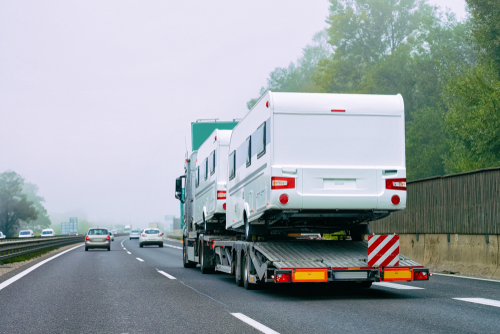
Prefer a more convenient and stress-free travel experience? Shipping your recreational vehicle with Nationwide Auto Transportation may be the ideal solution. By shipping your camper, you’ll be able to avoid the stress and hassle of towing. This should ensure a more relaxed and comfortable journey.
You’ll also be able to save time and money. By shipping your RV, you won’t need to worry about fuel, lodging, and other expenses associated with driving long distances.
You’re in the right place! Shipping your camper with Nationwide Auto Transportation comes with a lot of benefits that will make your life easier. Let’s take a look!
Why Shipping Your Camper with Nationwide Auto Transportation Is the Smart Choice
Firstly, it’s going to save you money. Yes, you heard that right! When you ship your camper, you’ll avoid all the expenses that come with driving long distances. Plus, you won’t need to take time off work or spend hours on the road. This can add up to even more savings.
But that’s not all! Shipping your camper can also be more convenient. You won’t have to worry about:
- driving a large vehicle through unfamiliar roads,
- dealing with traffic or road closures,
- or finding parking spaces big enough for your camper.
Nationwide Auto Transportation takes care of everything, making your life easier.
Safety is also a crucial factor to consider when it comes to shipping your camper. Nationwide Auto Transportation employs professional drivers who are trained to handle large vehicles like campers. These drivers are familiar with the rules and regulations of the road and can transport your camper safely. You can relax, knowing that your camper is in good hands.
Nationwide Auto Transportation specializes in transporting recreational vehicles of all shapes and sizes
Our team of professional drivers is trained to handle large vehicles. We use state-of-the-art equipment to ensure your camper is transported safely and securely. Our state to state transport includes shipping RVs to Florida.
What’s more, Nationwide Auto Transportation offers full insurance coverage during the shipping process. That means you don’t have to worry about anything happening to your camper during transport. In the unlikely event that something does happen, you can rest assured that your camper is covered.
Finally, Nationwide Auto Transportation offers real-time GPS tracking, so you can track your camper’s location throughout the shipping process. This way, you’ll always know where your camper is and when it will arrive at its destination.
In conclusion, shipping your camper with Nationwide Auto Transportation is a cost-effective, convenient, and safe option for transporting your camper to your desired location. Don’t hesitate to get in touch with Nationwide Auto Transportation today and get a free quote!

